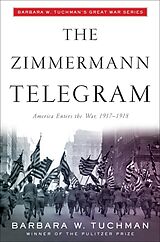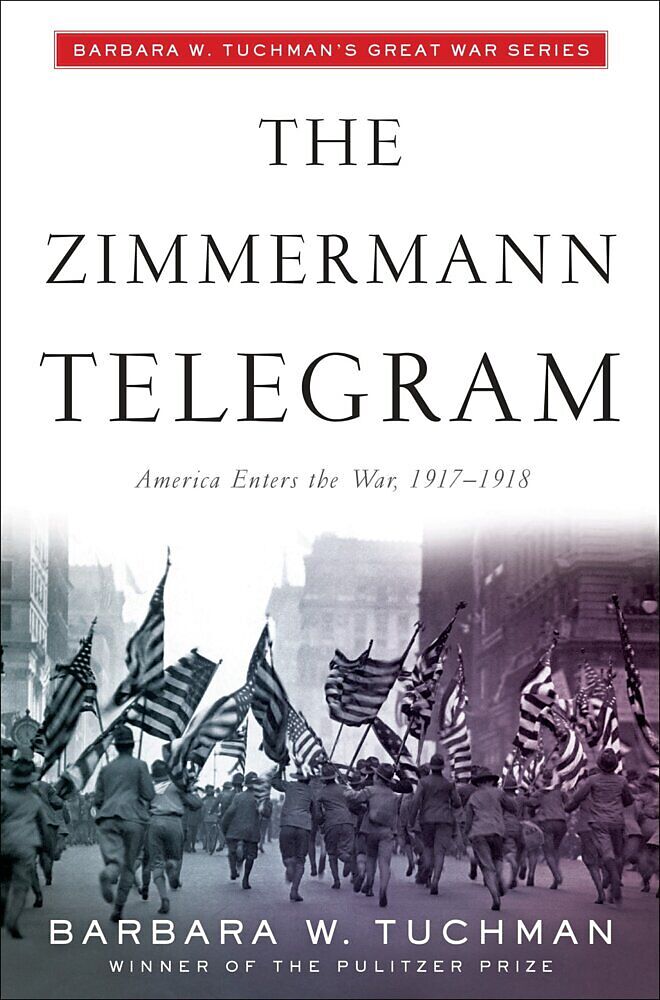The Zimmermann Telegram
Einband:
Broschiert
EAN:
9780345324252
Untertitel:
America Enters the War, 1917-1918; Barbara W. Tuchman's Great War Series
Genre:
Geschichte
Autor:
Barbara Tuchman
Herausgeber:
Random House N.Y.
Auflage:
Ballantine Bks
Anzahl Seiten:
256
Erscheinungsdatum:
12.03.1985
ISBN:
0345324250
Zusatztext A true! lucid thriller . . . a tremendous tale of hushed and unhushed uproars in the linked fields of war and diplomacy . . . Tuchman makes the most of it with a creative writer's sense of drama and a scholar's obeisance to the evidence. The New York Times The tale has most of the ingredients of an Eric Ambler spy thriller. Saturday Review Informationen zum Autor Barbara W. Tuchman (19121989) achieved prominence as a historian with The Zimmermann Telegram and international fame with The Guns of August a huge bestseller and winner of the Pulitzer Prize. Her other works include Bible and Sword, The Proud Tower, Stilwell and the American Experience in China (for which Tuchman was awarded a second Pulitzer Prize), Notes from China, A Distant Mirror, Practicing History, The March of Folly, and The First Salute . Klappentext The Proud Tower, the Pulitzer Prize-winning The Guns of August, and The Zimmermann Telegram comprise Barbara W. Tuchman's classic histories of the First World War era In January 1917, the war in Europe was, at best, a tragic standoff. Britain knew that all was lost unless the United States joined the war, but President Wilson was unshakable in his neutrality. At just this moment, a crack team of British decoders in a quiet office known as Room 40 intercepted a document that would change history. The Zimmermann telegram was a top-secret message to the president of Mexico, inviting him to join Germany and Japan in an invasion of the United States. How Britain managed to inform the American government without revealing that the German codes had been broken makes for an incredible story of espionage and intrigue as only Barbara W. Tuchman could tell it. Praise for The Zimmermann Telegram "A true, lucid thriller . . . a tremendous tale of hushed and unhushed uproars in the linked fields of war and diplomacy . . . Tuchman makes the most of it with a creative writer's sense of drama and a scholar's obeisance to the evidence."-The New York Times "The tale has most of the ingredients of an Eric Ambler spy thriller."-Saturday ReviewOne A Telegram Waylaid The first message of the morning watch plopped out of the pneumatic tube into the wire basket with no more premonitory rattle than usual. The duty officer at British Naval Intelligence twisted open the cartridge and examined the German wireless intercept it contained without noting anything of unusual significance. When a glance showed him that the message was in non-naval code, he sent it in to the Political Section in the inner room and thought no more about it. The date was January 17, 1917, past the halfway mark of a war that had already ground through thirty months of reckless carnage and no gain. On duty that morning in the inner room, the most secret in Whitehall, were two civilians diverted to cryptographic work masked under the guileless name of Room 40. One was the Reverend William Montgomery, a tall gray-haired scholar of forty-six, and the other Nigel de Grey, a young publisher of thirty-one borrowed from the firm of William Heinemann. Neither knew they were about to midwife a historic event. De Grey spread open the intercept, revealing rows of numerals arranged in four- and five- and a sprinkling of three-figure groups. Mute and passive on the paper, they gave forth no hint that a key to the war's deadlock lay concealed in their irregular jumble. De Grey noticed only that the message was of unusual length; more than a thousand groups, he estimated. The gray morning was cold as Britain's fortunes, dingy as her hopes in this third winter of the war. The ghastly losses on the Sommesixty thousand British casualties in a single mad day, over a million Allied and enemy losses in the five-month battlehad been for nothing. The Hindenburg Line was sti...
Autorentext
Barbara W. Tuchman (1912–1989) achieved prominence as a historian with The Zimmermann Telegram and international fame with The Guns of August—a huge bestseller and winner of the Pulitzer Prize. Her other works include Bible and Sword, The Proud Tower, Stilwell and the American Experience in China (for which Tuchman was awarded a second Pulitzer Prize), Notes from China, A Distant Mirror, Practicing History, The March of Folly, and The First Salute.
Klappentext
The Proud Tower, the Pulitzer Prize-winning The Guns of August, and The Zimmermann Telegram comprise Barbara W. Tuchman's classic histories of the First World War era
In January 1917, the war in Europe was, at best, a tragic standoff. Britain knew that all was lost unless the United States joined the war, but President Wilson was unshakable in his neutrality. At just this moment, a crack team of British decoders in a quiet office known as Room 40 intercepted a document that would change history. The Zimmermann telegram was a top-secret message to the president of Mexico, inviting him to join Germany and Japan in an invasion of the United States. How Britain managed to inform the American government without revealing that the German codes had been broken makes for an incredible story of espionage and intrigue as only Barbara W. Tuchman could tell it.
Praise for The Zimmermann Telegram
"A true, lucid thriller . . . a tremendous tale of hushed and unhushed uproars in the linked fields of war and diplomacy . . . Tuchman makes the most of it with a creative writer's sense of drama and a scholar's obeisance to the evidence."-The New York Times
"The tale has most of the ingredients of an Eric Ambler spy thriller."-Saturday Review
Zusammenfassung
“A tremendous tale of hushed and unhushed uproars in the linked fields of war and diplomacy” (The New York Times), from the Pulitzer Prize–winning author of The Guns of August
In January 1917, the war in Europe was, at best, a tragic standoff. Britain knew that all was lost unless the United States joined the war, but President Wilson was unshakable in his neutrality. At just this moment, a crack team of British decoders in a quiet office known as Room 40 intercepted a document that would change history. The Zimmermann telegram was a top-secret message to the president of Mexico, inviting him to join Germany and Japan in an invasion of the United States. How Britain managed to inform the American government without revealing that the German codes had been broken makes for an incredible story of espionage and intrigue as only Barbara W. Tuchman could tell it.
The Proud Tower, The Guns of August, and The Zimmermann Telegram comprise Barbara W. Tuchman’s classic histories of the First World War era.
Leseprobe
One
A Telegram Waylaid
The first message of the morning watch plopped out of the pneumatic tube into the wire basket with no more premonitory rattle than usual. The duty officer at British Naval Intelligence twisted open the cartridge and examined the German wireless intercept it contained without noting anything of unusual significance. When a glance showed him that the message was in non-naval code, he sent it in to the Political Section in the inner room and thought no more about it. The date was January 17, 1917, past the halfway mark of a war that had already ground through thirty months of reckless carnage and no gain.
On duty that morning in the inner room, the most secret in Whitehall, were two civilians diverted to cryptographic work masked under the guileless name of Room 40. One was the Reverend William Montgomery, a tall gray-haired scholar of forty-six, and the other Nigel de Grey, a young publisher of thirty-one borrowed from the firm of William Heinemann. Neither knew they were about to midwife a historic event. De Grey spread open the intercept, revealing rows of num…

Leider konnten wir für diesen Artikel keine Preise ermitteln ...
billigbuch.ch sucht jetzt für Sie die besten Angebote ...
Die aktuellen Verkaufspreise von 6 Onlineshops werden in Realtime abgefragt.
Sie können das gewünschte Produkt anschliessend direkt beim Anbieter Ihrer Wahl bestellen.
Loading...
Die aktuellen Verkaufspreise von 6 Onlineshops werden in Realtime abgefragt.
Sie können das gewünschte Produkt anschliessend direkt beim Anbieter Ihrer Wahl bestellen.
| # | Onlineshop | Preis CHF | Versand CHF | Total CHF | ||
|---|---|---|---|---|---|---|
| 1 | Seller | 0.00 | 0.00 | 0.00 |
